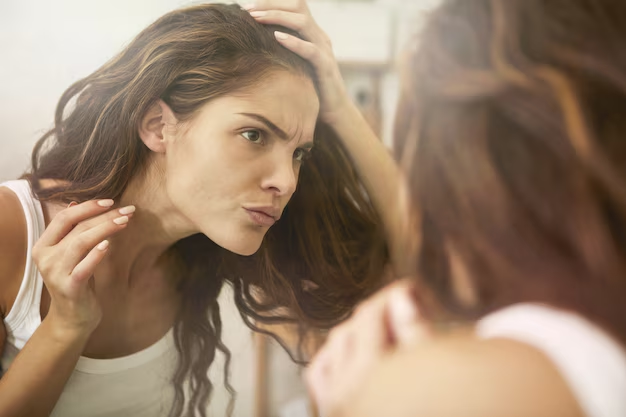Biotin and Acne: What's the Connection?
Does taking biotin lead to breakouts? It's a question that many beauty and health enthusiasts have asked over the years. Biotin, also known as vitamin B7, is a popular supplement touted for its benefits in promoting healthy hair, skin, and nails. However, some users have reported experiencing acne after starting a biotin regimen. This article delves into the potential relationship between biotin and acne, providing insights and considerations for those contemplating adding biotin to their daily routine.
Understanding Biotin: More Than Just a Beauty Supplement
What is Biotin?
Biotin is a water-soluble B-vitamin that plays a critical role in supporting the body's metabolic functions. It helps convert food into energy and is essential for maintaining the health of skin, hair, eyes, liver, and the nervous system. Many people take biotin supplements to enhance hair and nail growth, believing it contributes to a radiant complexion and sturdy nails.
Biotin's Popularity in the Beauty Industry
The beauty industry has embraced biotin as a key ingredient in various products. From shampoos to skin creams, biotin's presence suggests an association with healthy, glowing skin and strong, lustrous hair. However, increasing anecdotal evidence points to possible links between high dosing of biotin supplements and acne flare-ups.
Biotin and Acne: Is There a Direct Correlation?
Exploring the Anecdotal Evidence
Biotin-induced acne remains a widely-discussed topic online. Individuals across social media platforms and user forums have shared stories of breakout episodes aligned with the use of biotin supplements. But can these experiences be generalized, or are they isolated cases?
The Role of Vitamin B5: Balancing Act
One of the theories proposed by medical professionals to explain biotin-induced acne involves vitamin B5, also known as pantothenic acid. It's believed that biotin and vitamin B5 compete for absorption in the intestines. Since both belong to the B-vitamin family, an imbalance—an abundance of biotin and a shortage of vitamin B5—may stimulate the sebaceous glands, leading to increased oil production and potential acne outbreaks.
Factors That May Influence Biotin and Acne Outcomes
Dosage and Individual Responses
Like most supplements, the effects and side effects of biotin can vary based on individual responses. Body chemistry, existing health conditions, and the presence of other supplements or medications can all influence how one's body reacts to biotin supplementation.
While the National Institutes of Health suggests a daily intake of 30 mcg (micrograms) of biotin for adults, many over-the-counter biotin supplements offer doses of 5,000 to 10,000 mcg, considerably exceeding typical dietary needs. This over-supplementation is often linked with minor side effects, including skin disturbances.
Dietary Habits and Lifestyle Choices
Nutrition plays a significant role in skin health. A balanced diet that's rich in vitamins and minerals functions as a powerful ally in the fight against acne. Those consuming large doses of biotin should ensure adequate vitamin B5 intake, potentially through diet or additional supplements, to maintain a healthy balance. Foods rich in vitamin B5 include egg yolks, whole grains, poultry, and avocados.
Evaluating the Risks and Benefits of Biotin Supplementation
Benefits of Biotin
- Promotes hair growth: Biotin may support a faster growth rate and stronger hair shafts.
- Strengthens nails: It helps combat brittle nails, making them more resilient.
- Supports metabolic health: Biotin aids in breaking down macronutrients, sustaining energy and metabolic processes.
Potential Risks and Side Effects
- Digestive upset: Overconsumption can lead to gastrointestinal issues in some users.
- Acne flare-ups: Especially in those predisposed to acne or taking high doses.
- Misleading test results: High biotin levels can interfere with certain lab test results, particularly thyroid and hormone tests.
Natural Ways to Support Skin Health
Beyond Supplementation: Lifestyle Adjustments
For those seeking to enhance skin health without supplements, adopting a holistic approach is crucial:
- Hydration: Water supports the body's detoxification processes and maintains skin's elasticity.
- Nutrition: A diet rich in fruits, vegetables, lean proteins, and healthy fats ensures adequate vitamin intake.
- Skincare Routine: Using products appropriate for one's skin type and concerns can prevent or reduce acne.
- Stress Management: Stress can exacerbate skin conditions, so managing it through mindfulness or exercise is beneficial.
What to Consider Before Starting Biotin
Consultation with Healthcare Professionals
If you're contemplating taking biotin supplements, it's always advisable to consult healthcare providers, especially if you have existing health issues or are on medication that might interact with high vitamin B doses. They can provide guidance tailored to your health profile and nutritional needs.
Testing and Monitoring
For individuals opting to try biotin, paying attention to your body's responses is vital. Consider starting with a lower dose and observe changes in your skin or overall health. Keeping a journal can be beneficial in tracking these changes and making adjustments as necessary.
Empower Yourself with Knowledge
Understanding both the potential benefits and drawbacks of biotin is key to making informed health decisions. Whether choosing to supplement with biotin or to explore natural methods for enhancing beauty and skin health, prioritizing a balanced approach will often yield the best results. Remember, everyone's health journey is unique, and the path to achieving healthy skin and hair may vary from one individual to another.
Quick Tips for Navigating Biotin and Acne 📝
- 💊 Start Small: Begin biotin supplementation with a lower dose to assess your body's reaction.
- 🥦 Balance Your Diet: Ensure you're getting enough vitamin B5 alongside biotin to prevent imbalance.
- 🌿 Stay Natural: Consider boosting your diet with biotin-rich foods like eggs, nuts, and seeds.
- 🏥 Consult Professionals: Speak with a healthcare provider before starting a biotin regimen, especially if you have any pre-existing conditions.
- 🕵️♀️ Monitor Effects: Keep track of any changes in your skin health after starting biotin.
By considering all these factors, you can take proactive, informed steps towards supporting your skin's health while assessing biotin's role in your personal care routine.

